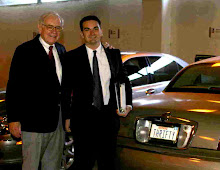The Best Investment I've Ever Made and Lessons Learned
One stock my broker convinced me to buy was in a company called Green Mountain Coffee Roasters (GMCR). It was 1997 and, adjusted for splits, my purchase price was around $5.00. The stock is now around $50, for an annualized return of about 27%. For ten years. The ride has not been a roller coaster, but it has been consistent. For me, it has been fun watching this company grow and my holdings grow along with it, all while the telecoms and dot-coms on which everyone else was so fixated soared, crashed and then disappeared.
In retrospect, the Green Mountain purchase seems somewhat prescient. It is exactly the type of company I look for today, but that I bought long before I knew the first thing about Warren Buffett. I am quite fortunate to have stumbled upon it, not only for its returns but for a lesson in how good business leads to success.
CEO Bob Stiller is an entrepreneur. He founded the company, has led the company throughout its history and still owns 32% of it personally. He is truly the patriarch of the company, and it is his value system that seems to guide the company. This value system is rooted in the following principle, as described on the company’s website:
“Green Mountain Coffee is dedicated to conducting business in a manner that balances economic goals with environmental and social impacts on the local and global communities.”
The hardened capitalist might object to this do-gooder business model, but that doesn’t bother the company. It is the socially responsible business practices, in fact, that attract customers to Green Mountain products anyhow. The drinkers of gourmet coffees, of course, are stereotypically young and liberal, and generally not too keen on "big corporations” like GMCR. As evidence of Green Mountain’s surmounting of this problem, observe the wild success of the company’s fair-trade coffees and Paul Newman’s “Newman’s Own” product line.
When I first learned about Green Mountain’s humanitarianism, I was skeptical. It just seems too easy for a firm to claim it is doing good, all while padding its own pockets. In ten years of watching the company and its philanthropy, I am convinced that I have not simply been getting lip service. Moreover, it is reassuring to know that folks with enough integrity to put charitable giving on the same level as profits are running my money. I trust the leaders of this company as much as I can trust any stranger.
While sitting across the table from Warren Buffett at lunch last fall, I asked him about a problem of mine that has impeded my investing ever since I first tried to emulate his style. “You say to invest in companies run by managers that you trust, but how can I, as an individual without direct access to them, determine if those managers are trustworthy?” His response? “Look at how they are compensated.”
How true. Rare is the crooked executive that doesn’t first find a way to pay himself handsomely. Key Lay, for example, is said to have taken nearly a quarter of a billion dollars from Enron before its fall. Bernie Ebbers was paid over $10 million in salary alone in 2000.
According to Green Mountain's latest proxy statement, Bob Stiller was paid no more than $400,000 in 2005. The company’s use of executive stock options has also been somewhat limited - Stiller also currently has options valued around $2,000,000. The next highest paid executives top out around $200,000 and far fewer options. These aren’t Buffett-esque compensation numbers, but they also aren’t outrageous, particularly for an individual who currently owns about $115 million worth of company stock.
I have neglected the fundamentals of the company in my analysis as that is not the focus, but can assure you they are terrific. Earnings have grown at a 21% clip to keep up with the rising stock price and ROE has averaged 17%, all while operating with very little debt, although recently the company did obtain a large revolving credit facility as part of its acquisition of single-cup-brewing-system maker Keurig, Inc. Keurig, it should be pointed out, is a fantastic competitive advantage to the company.
It is easy to overlook the honor of management when a company is performing well, but one should be careful not to do so. If the recent past has taught us anything, it is that a company is much more than a ticker symbol and a price, or even a balance sheet and an income statement. Trusting management is crucial to an investment decision, not only as a means to avoid disaster, but because trustworthy companies are just better businesses.
FD: As indicated in this article, I own shares of GMCR.


0 Comments:
Post a Comment
<< Home